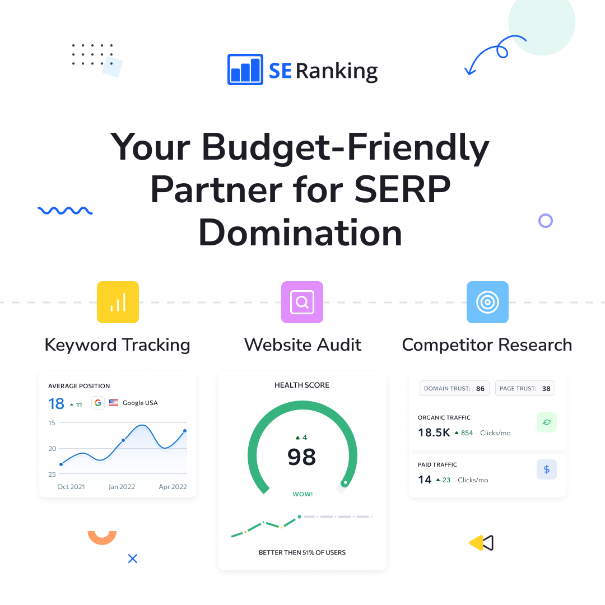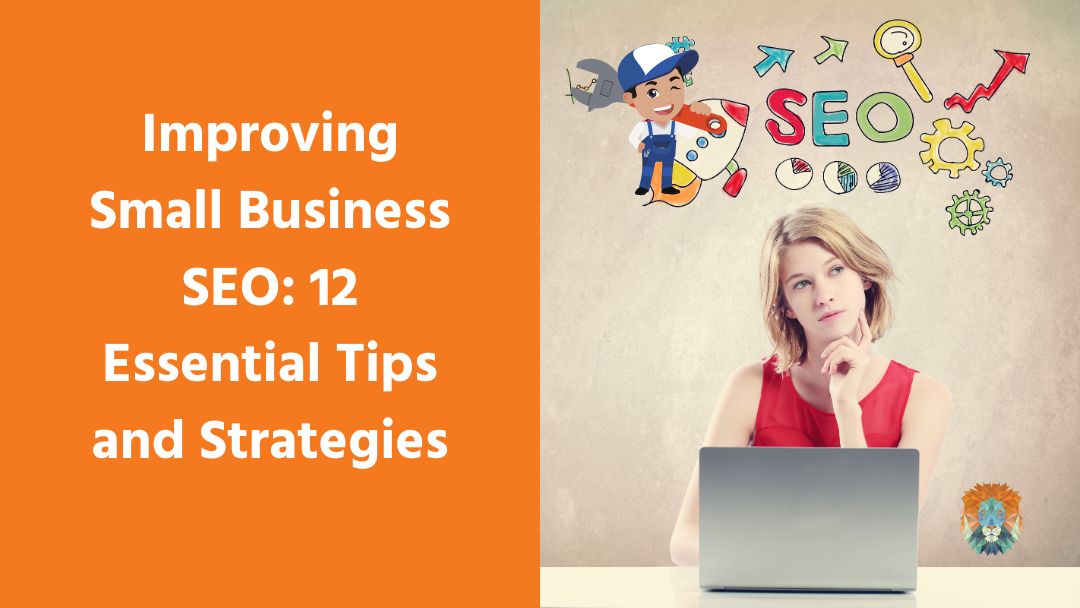Navigating the labyrinth of the internet, you’re determined to guide your small business to the front page of search results. In this article, we have what you are looking for!
As you journey through the digital landscape, we’ll be right there with you, offering insights into keyword research that resonate with your audience’s needs. You’ll learn how to optimise every nook of your website, ensuring search engines become your silent advocates.
We understand the importance of community; that’s why local SEO tactics are included to help you become a household name. Together, we’ll harness the power of mobile optimisation and social media to connect with your customers, wherever they are.
You’re not alone in this; we’re all part of a vibrant community of small businesses striving for recognition. Let’s begin this journey to elevate your SEO and find your place among the stars of the digital sky.
Key Takeaways
- Small Business SEO is a strategic toolkit that utilises keyword optimisation, quality content, and authoritative link building to optimise online presence and rank higher in search results.
- Small Business SEO targets niche, service-specific keywords to maximise brand exposure in a broader market and increase relevance for search queries.
- SEO for small businesses improves online visibility, builds credibility in the industry, and attracts quality traffic, leading to increased exposure and potential customers.
- Understanding audience needs and preferences, conducting keyword research, and analysing competitor strategies are crucial for crafting an effective SEO strategy.
What Is Small Business SEO, and how does it work?
As a small business owner, you’re tasked with optimising your online presence to rank higher in search results.
Small Business SEO is your strategic toolkit, leveraging keyword optimisation, quality content, and authoritative link building to boost your site’s relevance for search queries.
It’s a data-driven process, distinguishing you from local competitors and connecting you with your target audience effectively.
Small Business SEO vs. Local SEO
Why should you understand the difference between Small Business SEO and Local SEO when crafting your online strategy? Recognizing the nuances allows you to tailor your approach, ensuring you’re visible to the right audience. Consider these key points:
- Small Business SEO targets niche, service-specific keywords, maximising your brand’s exposure in a broader market.
- Local SEO leverages location-based keywords, essential for appearing in local search results and maps, like the Google My Business listing.
- Strategic local marketing involves optimising for both local search engines and directories, fostering a sense of community presence.
- While Local SEO is crucial for driving foot traffic and local engagement, Small Business SEO expands your reach, attracting customers who are looking for specialised solutions that you offer.
Benefits of SEO for Small Business
When you optimise your small business for search engines, you’re not just improving your visibility; you’re also building credibility in your industry.
By focusing on SEO, you’ll see a surge in traffic that’s not only larger, but more targeted, connecting you with customers actively seeking your services.
Moreover, it places you ahead of competitors and ensures your business is discoverable around the clock, maximising opportunities for growth.
Increased Awareness and credibility
Implementing these 12 essential SEO strategies can significantly boost your small business’s online visibility and bolster its credibility among customers. A robust SEO strategy aids in connecting with your target audience through:
- Enhanced search engine rankings, leading to increased exposure.
- Attracting quality traffic that’s more likely to engage with your brand.
- Establishing thought leadership by providing valuable content.
- Building an enduring online presence that fosters brand credibility.
By focusing on these strategic areas, you’re not just optimising for search engines; you’re creating a community where customers feel they belong.
Data shows that a strong SEO foundation can transform how potential clients perceive your business, ultimately making them more likely to trust and invest in your offerings.
Increased Traffic
By optimising your website’s SEO, you’ll likely see a surge in traffic, as a well-ranked site draws more potential customers searching for your products or services. Embracing search engine optimisation strategically amplifies your search rankings, making your small business more visible to those who need it most.
This isn’t just about increasing numbers—it’s about boosting targeted traffic, visitors primed by their search queries to engage with what you offer. With meticulous SEO practices, you’re positioning yourself to drive traffic that’s not only higher in volume but richer in relevance.
Connect With Your Target Audience Early
Understanding your audience’s needs and preferences, you’ll craft an SEO strategy that resonates with them from the outset, ensuring they find your small business exactly when they need you. By aligning your content strategy with search intent and conducting thorough keyword research, you’ll attract targeted visitors who are more likely to engage and convert.
- Perform keyword research to understand the language and queries of your target audience.
- Develop a content strategy that answers the specific questions and needs of your audience.
- Optimise for search intent to ensure your content aligns with what your audience seeks.
- Engage with your audience early, fostering a sense of belonging and community around your brand.
This targeted approach helps establish an early and meaningful connection, setting the stage for long-term brand loyalty.
Competitive Advantage
As you refine your SEO strategy, you’ll gain a competitive edge that can set your small business apart in a crowded marketplace. By optimising your website with smart SEO tactics, focusing on target keywords relevant to your niche, and creating an inviting online presence, you’re not just chasing rankings—you’re building a community.
A well-optimised small business website acts as a beacon to search engines and potential customers alike, signalling that you’re a credible, trustworthy choice. Strategic use of SEO can reduce marketing costs and position you ahead of competitors who may not be leveraging SEO effectively.
You’re Open 24/7
Consistently optimising your website for SEO ensures that your small business is discoverable to potential customers at any hour, day or night. Here’s how you fit into the digital landscape:
- Higher Search Engine Rankings: SEO boosts your website’s visibility, placing you in front of customers when they search for your products or services.
- Increased Traffic: With the right keywords, your site draws in users actively seeking what you offer, even outside business hours.
- Constant Accessibility: Your online presence acts as a perpetual storefront, welcoming visitors and potential buyers 24/7.
- Engagement Opportunities: SEO opens up avenues to engage with a community that’s searching for a place to belong, creating loyal customers and brand advocates.
It’s Free (mostly)
Leverage the mostly free benefits of SEO to boost your small business’s online presence without breaking the bank. By harnessing free Google tools like Google Analytics and Google Keyword Planner, you can gain valuable insights into your audience’s behaviour and preferences.
However, all of the above and learning how to effectively use the tips we have outlined below take time and a lot of it! It might be better for you to outsource this to an SEO professional who will get you results quickly and provide you with a faster return on your investment, leaving you to run your business.
12 SEO Tips for Small Businesses

1. Set Up Google Search Console and Google Analytics
Before delving into more complex SEO strategies, ensure you’ve set up Google Search Console and Google Analytics for your small business to monitor your site’s performance effectively. These SEO tools are crucial for understanding and improving your online presence.
- See what Google sees: Google Search Console helps you pinpoint issues that could harm your rankings, giving you the insight to optimise your website efficiently.
- Track Keywords: Monitor which keywords are driving traffic to your site and adjust your strategy accordingly.
- Analyse Traffic: Google Analytics provides data on who visits your site, how they interact with it, and what content performs best.
- Informed Decisions: Combining insights from both tools allows for strategic, data-driven decisions to refine your SEO approach and foster a sense of community around your brand.
2. Set Up Google Business Profile

Moving beyond basic analytics, setting up a Google Business Profile is a crucial step to bolster your small business’s SEO and ensure local customers find you. As a local business owner, your presence on Google Business Profile directly influences how customers search for and discover your services on search engine results pages.
By meticulously crafting your profile, you’re providing critical data to Google’s algorithm, enhancing your visibility when potential customers seek out products or services you offer. Remember, in the digital realm, strategic, data-driven decisions foster a sense of belonging and community around your brand.
Integrating Google Business Profile into your SEO strategy isn’t just smart—it’s essential for maintaining a competitive edge and connecting with your local customer base.
3. Find the right keywords for your business
Identifying the right keywords is crucial for your small business’s SEO success, as it drives targeted traffic to your website. To climb the keyword ranking and appear in search engine results, it’s important to strategically select search terms.
Here’s how to find relevant keywords that resonate with your community:
- Understand Your Audience: Analyse their needs to pinpoint relevant keywords.
- Use Keyword Tools: Employ tools like Google Ads Keyword Planner for ideas.
- Incorporate Long-Tail Keywords: Target niche topics for better visibility.
- Analyse Search Behavior: Adapt your content strategy to match audience searches.
4. Analyse your Competitors
You’ll gain a competitive edge by meticulously analysing your rivals’ SEO tactics to see where you can outperform them.
Dive into the search engine results page and study which competitors consistently rank above you. By enlisting an SEO expert or employing robust analytical tools, you can decode their success.
Look at the keywords they’re targeting, the structure of their content, and their backlink profiles. This isn’t just about copying what they do; it’s about identifying gaps in their strategies that you can exploit.
Strategically, your aim is to carve out a unique space in the search results. By understanding your competitors’ moves, you can enhance your own ranking.
You can get started doing this with a free trial from SEO Ranking using the form below:
Read more: How to find your competitors keywords
5. Check your website’s content
Assessing your website’s content is crucial for optimising your SEO strategy and ensuring you’re meeting the needs of your audience. To resonate with both your community and search engines, you must be strategic and data-driven in your approach.
Here are four key strategies:
- Incorporate Relevant Keywords: Analyse and integrate keywords that align with your audience’s search intent.
- Create Fresh Content: Regularly publish new content to keep your site dynamic and engaging.
- Optimise Content Quality: Ensure all content is high-quality, informative, and adds value to your readers.
- Match Content with User Intent: Tailor your content to answer the questions your audience is asking.
6. Run a website audit to find basic SEO issues and fix them
To effectively boost your small business’s online presence, start by running a website audit to pinpoint and resolve fundamental SEO issues. This strategic move allows you to identify technical SEO problems that could be hindering your site’s performance, such as broken links or inadequate meta descriptions. By addressing these basic SEO issues, you’re laying a solid foundation for your on-page SEO.
Utilise reliable audit tools to systematically uncover areas for improvement. Once identified, prioritise these issues and fix them efficiently. Remember, technical fixes contribute significantly to your website’s health and user experience.
Moreover, by consistently monitoring your site’s progress through keyword-ranking tools like SE Ranking and Google Analytics, you can make informed, data-driven decisions that foster a sense of community and belonging among your audience.

7. Optimise for On-Page SEO
To elevate your small business’s online presence, it’s imperative to optimise your on-page SEO strategies.
To optimise on-page SEO, you should consider the following elements and strategies:
1. Title Tags
- Ensure your titles are unique for each page.
- Keep your titles under 60 characters.
- Place important keywords towards the beginning of the title.
- Make sure the title is relevant to the page content.
2. Meta Descriptions
- Write compelling meta descriptions that encourage clicks
- Keep them between 150-160 characters
- Include target keywords and a call-to-action
3. Headings (H1, H2, H3, etc.)
- Use headings to structure your content
- Include relevant keywords in at least some of the headings
- Only use one H1 per page, typically for the title
4. URL Structure
- Use SEO-friendly URLs that are short and include keywords
- Use hyphens to separate words
- Keep URLs descriptive and relevant to the page topic
5. Keyword Optimisation
- Research and use relevant keywords naturally in your content
- Avoid keyword stuffing
- Use long-tail keywords to target specific queries
6. Image Optimisation
- Use descriptive file names for images
- Optimize alt tags with relevant keywords
- Compress images to reduce page load times
7. Internal Linking
- Link to other pages on your site with relevant anchor text
- Ensure links are useful for readers and provide additional value
8. External Linking
- Link out to authoritative and relevant sources when appropriate
- Ensure all external links are working and add value to the content
9. Page Load Speed
- Optimise images and files to load quickly
- Use caching and a content delivery network (CDN) if possible
- Minimise the use of large scripts and plugins
11. Mobile-Friendliness
- Ensure your site is responsive and looks good on all devices
- Consider the user experience on mobile devices
- Use Google’s Mobile-Friendly Test tool to check your site
12. User Experience (UX)
- Ensure your site is easy to navigate
- Use a clear and consistent layout
- Keep your site free of intrusive ads and pop-ups
13. SSL Certificate
- Use HTTPS to secure your site and increase trust with users
14. Canonical Tags
- Use canonical tags to prevent issues with duplicate content.
15. Robots.txt and Sitemap
- Use robots.txt to tell search engines which pages should not be indexed
- Provide a sitemap to search engines for easier crawling of your site
16. Core Web Vitals.

- Focus on improving metrics such as Largest Contentful Paint (LCP), First Input Delay (FID), and Cumulative Layout Shift (CLS) as part of Google’s Core Web Vitals
17. Add Schema Markup
Incorporating schema markup into your website’s code can significantly boost your content’s visibility in search results.
- Enhance content understanding for search engines.
- Improve your SEO with rich snippets.
- Aid search engine results with clear data.
- Help improve website ranks with structured context.
These steps are pivotal for ensuring you’re part of a community where every member’s site stands out to both users and search engines.
Regularly analysing and updating these on-page SEO factors can help improve your site’s visibility and ranking in search engine results pages (SERPs). Remember, SEO is an ongoing process, and staying up-to-date with best practices and search engine algorithm updates is crucial for maintaining and improving your SEO performance.
The Rankmath WordPress plugin is perfect for adding Schema markup to your site.
8. Write Content that your Customers would be interested in and share it
Crafting content that resonates with your audience can significantly amplify your SEO efforts, encouraging shares and bolstering your online presence.
To engage potential customers, produce various types of content, from informative blog posts to interactive graphics, all tailored to their interests and questions.
When you use the right keywords, you’re not just optimizing for search engines; you’re also ensuring that your content speaks directly to your audience’s needs.
Sharing this content on social media increases its reach and potential for virality, as satisfied readers are more likely to spread the word.
9. Create Relevant directory listings for Your Business
For your small business to climb search engine rankings, start by listing it on relevant directories. Crafting a strategic business profile on platforms like Google My Business can significantly enhance your local visibility. Here’s how you can leverage directory listings effectively:
- Select Respected Directories: Prioritise directories that are authoritative and have a high domain authority.
- Optimise for Local SEO: Ensure your listings include local keywords, which boost your relevance on local search engine results pages.
- Maintain Consistency: Keep your business details consistent across all directory listings to establish credibility.
- Monitor and Update: Regularly review your listings to keep them accurate and up-to-date, responding to changes in your business.
10. Ask Your Suppliers and Business Associations to Link to Your Website
Leveraging every available resource, you should also ask your suppliers and business associations to create backlinks to your website, enhancing your SEO and boosting your online presence. This strategic link-building effort can significantly improve your local SEO, making it a pivotal move for small businesses.
Backlinks serve as nods of credibility to search engines, indicating that your website is a trusted source within your industry.
By securing these valuable links back to your website, you’re not just improving your search engine rankings, but also fostering a sense of belonging within your business network.
Data-driven SEO practices show that a robust backlink profile from reputable partners can drive targeted referral traffic, augmenting your digital footprint and strengthening your position in the market.
11. Encourage your customers to review your business and respond to them
Encourage your customers to leave reviews on your site and make sure you’re responding to their feedback to boost your SEO and build trust with potential clients. Reviews are a powerful tool, serving as social proof to newcomers and influencing your rankings on search engines.
Here’s how to leverage them:
- Set up your Google Business profile to make it easy for customers to review your business.
- Actively ask customers to leave a review after a purchase or service.
- Monitor and respond to reviews promptly to show engagement.
- Analyse review data for insights on customer satisfaction and SEO improvement areas.
12. Track Your Keyword Rankings
To effectively gauge your site’s SEO progress, you’ll need to track your keyword rankings regularly. Understanding where you stand in Google search results is critical; it informs you if you’re on the right path to rank higher.
By using keyword tracking tools, you’re not just collecting data; you’re joining a community of savvy business owners who rely on concrete insights to thrive.
When you track your keyword rankings, you’re empowered with the knowledge of how searchers find you and how you can refine your content strategy to meet their needs. This data-driven approach ensures you’re not left behind as SEO evolves.
Be meticulous, stay informed, and watch as your efforts help you climb the ranks, fostering a sense of belonging among your peers in the digital landscape.
At Lion Spirit Media, we use SE Ranking to monitor our customer’s websites and keyword rankings. The cost is reasonable for small business owners, and you can try it for free by clicking this link.
Frequently asked questions
Is SEO worth it for small businesses?
Investing in SEO is often a game-changer for small businesses looking to increase online visibility and attract more customers. As a small business owner, you may be asking, ‘Is SEO worth it for my business?’ The answer is rooted in data-driven analysis:
- Increased Visibility: SEO helps your business rank higher in search results, making it easier for customers to find you.
- Cost-Effectiveness: Compared to paid advertising, successful SEO provides a higher return on investment over time.
- Sustainable Traffic: Effective SEO strategies drive more traffic to your website and maintain consistent growth.
- Competitive Edge: With hard work and a strong SEO game plan, your business can outshine competitors in search rankings.
Embrace SEO as a critical component of your digital strategy to foster a sense of belonging in the online community.
Can I do SEO without paying?
While SEO can significantly boost your small business’s visibility online, you might wonder if you can achieve these benefits without spending money. The answer is yes, with the right strategy, you can improve your SEO and connect with your target customers.
Start by focusing on best practices: use long-tail keywords to align with specific search queries, and create high-quality content that addresses the needs and interests of your audience. Building reputable backlinks and optimising meta tags can also help your business climb search rankings organically.
Stay informed on SEO trends to adapt your approach as needed. By investing time in these areas, you can foster a sense of community around your brand and enhance your online presence without a direct financial investment.
However, it takes a lot of effort to learn how to effectively undertake SEO, so why not hire someone to do this for you? You will also need a tool to help with this; SE Ranking is perfect for getting started with this; it will audit your website, track keywords, give you insights on improvements, check your competitor’s performance and much more.

We offer SEO packages to suit most businesses’ budgets and can combine with PPC adverts to make your website the ultimate lead-generating/sales machine.
How much does SEO cost for a small business?
When considering SEO for your small business, you’re likely wondering about the costs, and they can vary significantly based on your specific needs and goals. Here’s what you might expect:
- DIY Approach: Minimal costs aside from time and learning resources, but requires a significant investment in acquiring SEO knowledge.
- Basic SEO Services: Starting from around £350 per month, suitable for building local visibility and digital marketing foundations.
- Comprehensive SEO Strategies: Can range be £1000+ a month, ideal for competitive industries and aggressive growth.
- Hire an SEO Consultant: Rates vary, but investing in expert advice can optimize your small engine of growth, balancing initial SEO cost with potential long-term gains.
How are keywords used on the page?
In optimising your web pages, it’s crucial to place your chosen keywords where they’ll have the most impact, such as in the title, headers, and body of your content. Carefully selected keywords help search engines understand and rank your page, ensuring your content matches user queries.
Your title tag should feature primary keywords as it signals the main topic to search engines and users alike. Similarly, the meta description, serving as a brief preview in search results, must include relevant keywords to encourage clicks.
Strategic use of keywords within your content connects with your audience, fostering a sense of belonging as they find exactly what they’re searching for, and in turn, strengthens your SEO efforts.
What are organic rankings?
You might be wondering what exactly organic rankings are and how they can impact your small business’s online visibility.
Organic rankings are positions your website naturally achieves in search engine results without paying for placement.
Conclusion
In conclusion, refining your small business SEO isn’t just strategic—it’s critical. By leveraging precise keywords, honing on-page elements, and engaging with local and mobile audiences, you’re positioning your brand where it thrives: in full view.
Analyse your data, track your progress, and adapt. Remember, SEO is an investment in your online footprint.
With these 12 essential tips, you’re not just chasing visibility; you’re building a legacy of digital excellence.
Now, go forth and optimise!
As always, if you need help with your SEO, then get in touch with us today!





0 Comments